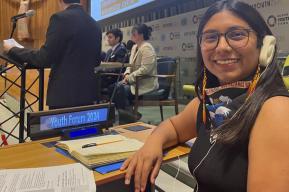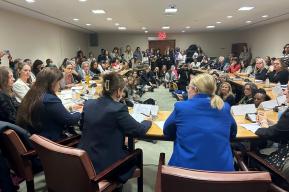News
UNESCO Member States Map the Way Forward in Combating Online Violence Against Women Journalists

Led by the Permanent Delegations of Slovakia and Austria, the Group of Friends for the Safety of Journalists at UNESCO and other Member State representatives engaged in a dialogue on the implementation of recommendations for action against online violence against women journalists.
Online violence against women journalists continues to be a prevalent and persisting problem. A year after the launch of The Chilling: A global study of online violence against women journalists, representatives of UNESCO’s Member States gathered at the Paris Headquarters on 25 October to discuss the impacts of online violence against women journalists and explore viable solutions. The discussion was based on the recommendations set forth by “The Chilling” report and the outcome of the recent stocktaking exercise covering a decade of progress in implementing the UN Plan of Action on the Safety of Journalists and the Issue of Impunity.
In a keynote speech, Reem Alsalem, the United Nations’ Special Rapporteur for Violence Against Women and Girls, reflected on the ongoing conflict in the Middle East, which has already cost the lives of numerous journalists, including women. This distressing trend, highlighted in UNESCO Director-General's Report on the Safety of Journalists and the Issue of Impunity, has seen an alarming rise in the killings of women journalists worldwide.
The Special Rapporteur pointed out that that women journalists face disproportionate targeting through smear campaigns and surveillance. Such tactics are often preliminary to life-threatening attacks. While the spillover of online violence into the offline world is clear, speakers stressed that online violence should be treated as violence, regardless of its potential connection to offline violence.
Proposed Solutions from Media and Digital Platforms
During the discussion focused on potential solutions, Priyanka Bhalla, Safety manager at Meta, presented the company’s approach, which includes policies addressing harassment and adult sexual exploitation, self-protection tools and partnerships. However, the isolation felt by many women journalists in dealing with attacks requires more comprehensive approach involving active engagement from various entities. Rita Rudusa, a veteran journalist, described the risk for self-censorship resulting from a lack of support, having herself resorted to silence in response to online attacks. She stressed the responsibility of media companies in supporting journalists and the need for a more robust enforcement of laws to protect journalists and hold perpetrators accountable.
A Role for Member States
Panelists evoked the crucial role that Member States have in tackling online violence against journalists, including the establishment of relevant national mechanisms. In light of this, examples from the National Advisory Committee Information in Nigeria and the National Observatory of Violence Against Journalists in Brazil were shared.
However, these institutions can only be effective if journalists have confidence in their responsiveness. Mariane Pearl, a journalist and advocate for journalists’ safety, stressed the persisting reluctance of women journalists to report online violence. This is especially worrisome In view of the upcoming ‘super-elections’ year in 2024, where over 80 countries are set to hold elections, a period when several speakers recognized an upsurge in violence against journalists in their respective countries.
The event coincided with Global Media and Information Literacy Week and underlined the importance of media literacy in preventing the spread of hate speech and online violence, also echoed by Camila Vallejo, Spokesperson of the Chilean Government, in a video message.
The discussion also paved the way for the International Day to End Impunity for Crimes Against Journalists on 2 November. The global commemoration was held in Washington DC in cooperation with the Organization of American States (OAS) and national and regional events were organized around the world. This year’s commemoration spotlighted the importance of safety of journalists during elections. On this occasion, the UNESCO Office for the Maghreb launched the Arabic adaptation of the “How to Report Safely self-directed course” with a workshop for women journalists in Tunis on 1 November 2023.









